
Drawing on Foucault’s concepts of biopolitical subject formation and governmentality, this article seeks to understand transnational state power and how Vietnamese migrant workers negotiate within a transnational framework both while working in Malaysia and upon their return to Vietnam. By conducting multi-sited interviews in Vietnam and Malaysia between 2008 and 2015, we contribute to the transnational labor migration literature by focusing on Vietnamese factory and construction workers in Malaysia and their resistance to transnational state power. We argue that these two emerging economies, as part of the neoliberal world, use their systems, media, and technologies to produce and manage citizens (in Vietnam) and non-citizen subjects (migrants in Malaysia) who comply with labor export policy and foreign worker policy, respectively. These two states ensure both government and individual accumulation to sustain their power. Meanwhile, Vietnamese migrant subjects negotiate their roles, resist when necessary, and at times, even benefit from overseas labor migration.
